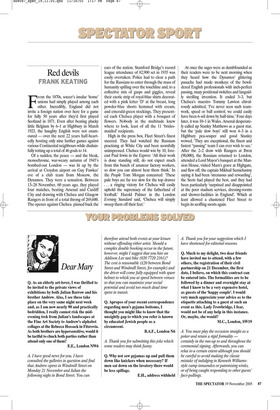Red devils
FRANK KEATING
From the 1870s, soccer’s insular ‘home’ unions had simply played among each other. Incredibly, England did not invite a foreign nation over here for a game for fully 50 years after they’d first played Scotland in 1871. Even after beating plucky little Belgium by 6–1 at Highbury in March 1923, the haughty English were not enamoured — over the next 22 years half-heartedly hosting only nine further games against various Continental neighbours while disdainfully totting up a total of 46 goals to 14.
Of a sudden, the peace — and the bleak, monochrome, war-weary autumn of 1945’s bombed-out London — was lit up by the arrival at Croydon airport on Guy Fawkes’ eve of a club team from Moscow, the Dynamos. They were a sensation. Between 13–28 November, 60 years ago, they played four matches, beating Arsenal and Cardiff City and drawing with Chelsea and Glasgow Rangers in front of a total throng of 269,600. The opener against Chelsea pinned back the ears of the nation. Stamford Bridge’s record league attendance of 82,900 set in 1935 was easily overtaken. Police had to clear a path for the Russians to enter through the mass of humanity spilling over the touchline and, to a collective mix of gasps and giggles, reveal their exotic strip of royal-blue shirts decorated with a pink letter ‘D’ at the breast, long powder-blue shorts hemmed with cream, and emerald-green stockings. They presented each Chelsea player with a bouquet of flowers. Nobody in the multitude knew where to look, least of all the 11 ‘bridesmaided’ recipients.
High in the press box, Fleet Street’s finest sneered. They had watched the Russians practising at White City and been scornfully unimpressed. Chelsea would win by 10, forecast Paul Irwin in the Express: ‘All their work is done standing still, do not expect much from this bunch of amateur factory workers, so slow you can almost hear them think.’ In the People Tom Morgan concurred: ‘These pale boys are far too slow for the top drawer ... a ringing victory for Chelsea will easily uphold the supremacy of the fatherland of football.’ Harold Palmer in the London Evening Standard said, ‘Chelsea will simply sweep them off their feet.’ At once the sages were as dumbfounded as their readers were to be next morning when they heard how the Dynamos’ glittering panache had made monkeys of the bewildered English professionals with inch-perfect passing, mazy positional switches and languidly strolling invention. It ended 3–3, but Chelsea’s maestro Tommy Lawton chivalrously admitted, ‘I’ve never seen such teamwork, speed or ball control; we could easily have been 6–nil down by half-time.’ Four days later, it was 10–1 in Wales. Arsenal desperately called up Stanley Matthews as a guest star, but the ‘pale slow boys’ still won 4–3 in a Highbury pea-souper and good Stanley wowed, ‘They are exceptional, the finest and fastest “passing” team I can ever wish to see.’ After the 2–2 draw with Rangers at Ibrox (90,000), the Russians returned to London, attended a Lord Mayor’s banquet at the Mansion House, visited Marx’s grave at Highgate, and flew off, the captain Mikhail Semichastny saying it had been ‘strenuous and rewarding’, the Scots had played the best, and they had been particularly ‘surprised and disappointed at the poor stadium services, dressing-rooms and shower-facilities in England’. Which at least allowed a chastened Fleet Street to begin its scoffing snorts again.

























































 Previous page
Previous page